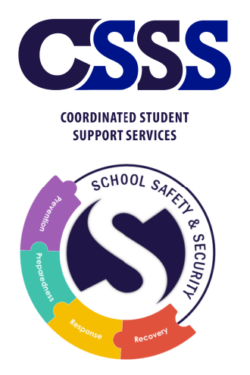Staff Development and Resources for Teachers
Training and instruction for bullying prevention and intervention of all administrators, certified staff, support staff, and ancillary groups should include developing awareness, skill-building, and monitoring progress to effectively prevent and/or intervene in bullying behaviors and encourage pro-social behaviors. The staff development plan should additionally provide training for staff or others who would need the information. The staff development plan should additionally provide training for new staff or others who would need the information.
Education/Training Plan
- Training and instruction of all groups (certified and non-certified staff, students, parents/community, volunteers, etc.) will support the development of a safe and secure environment.
- A comprehensive training/education plan, based on the school’s needs, is ongoing and includes developing awareness, skill-building (prevention and intervention strategies), and monitoring progress.
- The education plan for students develops sequentially through all grade levels. It provides helpful resources for students who are bystanders, targets of bullying behaviors, and engaging in the use of bullying behaviors.
Staff Development Plan
Introductory staff development provides awareness of bullying and can be conducted through direct presentations, meetings, role plays, video resources, literature, etc. and may include the following: The plan should be updated annually for all staff. Updates to the plan should be based on data-informed decisions based on specific school needs.
- Explanation of the district’s goal, definition of bullying and anti-bullying policy
- Vocabulary related to bullying
- Clarification of the difference between bullying and normal conflict, bullying and harassment
- Types of bullying and examples of bullying behaviors
- Explanation of related issues (sexual harassment, other harassment, hazing, cyberbullying)
- Characteristics of the participants in bullying situations (bully, target, bystander)
- Research or information on the impact of bullying on individuals, academic performance, and school climate
- Data from the school to indicate the effectiveness of the program and to determine where updates are needed
- Specialized training as needed (schools may designate a person(s) whose primary responsibility is working specifically with social skills training for those students who are involved in the bully continuum
Steps teachers can take when they witness a student engaging in bullying behavior:
- Intervene, bring it up, point it out
- Make sure the student knows what the problem behavior is
- Tell students that bullying is taken seriously and will not be tolerated
- Develop social skills training for students engaged in bullying behavior and model appropriate behaviors; teach tolerance
Steps teachers can take when talking to a victim/target of bullying behavior:
- Intervene right away
- Make sure student knows that bullying is not their fault
- Ask the student being bullied what can be done to make them feel safe
- Develop a game plan with a team
For more information on bullying and bullying prevention, visit:
https://www.stopbullying.gov/prevention/index.html
https://www.apa.org/helpcenter/bullying
Specialized Training for schools designated person(s):
The following are free to low-cost resources and training for schools that may find these resources useful to their specific needs. Schools may designate a person or team to receive training to lead efforts against bullying behavior in schools.
Target Bullying Intervention Program (T-BIP)
The T-BIP is a FREE individualized program provided by supervised trained specialists for students ages 7 to 18 years old who are involved in bullying, whether that be through victimization, perpetration, or both. The T-BIP is a one-on-one, three-hour cognitive behavioral intervention tailored to specific student concerns. T-BIP specialists help uncover and address involvement in bullying and provide specific recommendations based on assessments. Recommendations are aimed at stopping bullying involvement and restoring relationships. Parent consent and student assent are required before student participation in the T-BIP, as de-identified information is used in the Target Bullying Intervention Program Research Study.
Two occasions have been held for training on the T-BIP in collaboration with the Nebraska Department of Education. Talk to your school administrators about implementing the T-BIP in your school or attend a free training.
Visit the following link for more information or to request a T-BIP intervention visit. https://cehs.unl.edu/empowerment/target-bullying-involvement-program/
WITS Program Foundation: https://witsprogram.ca/
WITS is a program developed in Canada that teaches conflict resolution strategies. Training is free and includes manuals and lesson plans.
Cognitive Behavioral Intervention for Trauma in Schools (CBITS):
CBITS is a free training program that explains how to implement a school-wide intervention in schools to help students who have experienced trauma. The online training is free and is divided in two training sessions. After registration, participants can access videotaped training and advice from intervention developers and experienced CBITS providers. Downloadable materials and resources are available free of charge. Participants have access to an online community where they can take part in peer-to-peer discussion boards, share documents, and ask experts.
Completing both training sessions provides 10 continuing education credit hours (APA, ASWB, NBCC).
Teachers and Parents as Partners (TAPP):
This training will teach you the basic skills for being an effective TAPP consultant in schools. During this training, you will learn evidence-based strategies for forming family-school partnerships, develop TAPP consultation skills, hear about real TAPP cases, and view videos demonstrating part of the TAPP process.
$20.00 for training ($10.00 for students)
Head Space: https://www.headspace.com/
It teaches students to be present and rest in the here and now. It teaches students to fully engage in whatever they are doing. It helps reduce stress levels, increase focus, and sleep better. It is the practice of being mindful, defined by The American Psychological Association, “as a moment-to-moment awareness of one’s experience without judgment. In this sense, mindfulness is a state and not a trait. While it might be promoted by certain practices or activities, such as meditation, it is not equivalent to or synonymous with them” (APA, 2012)
National PTA of School Excellence: https://www.pta.org/home/programs
Provides free resources to help schools increase their school climate. Programs include School of Excellence, Reflection Art Program, STEM+Families, Family Reading Experience, PTA Connected, and Healthy Lifestyles.
Online MSW Programs: https://www.onlinemswprograms.com/resources/social-issues/
This is a great resource for cyberbullying, specifically for social workers. It provides quick facts on the harms of cyberbullying and specific steps schools, students, teachers, and parents can take.
Compartitech: https://www.comparitech.com/blog/vpn-privacy/boundless-bullies/
This great resource for cyberbullying provides excellent graphics and facts about cyberbullying.
How social workers can prevent bullying:
https://mastersinsocialworkonline.org/resources/cyberbullying






